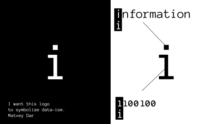Dataism
The term dataism (not to be confused with the artistic and literary movement Dadaism ) is a term that has been used to describe the mindset or philosophy created by the emerging meaning of big data . It was first used by David Brooks (journalist) in the New York Times in 2013. More recently, the term has expanded to describe what social scientist Yuval Noah Harari has called an emerging ideology, or even a new form of religion, in which the 'flow of information' is the 'highest value'.
history
"If you asked me to describe the emerging philosophy of the day, I would say it is dataism," wrote David Brooks in the New York Times in February 2013. Brooks argued that in a world of increasing complexity, reliance on data reduce cognitive biases and "illuminate patterns of behavior that we have not yet noticed".
In 2015, Steve Lohr's book 'Data-ism' examined how big data is changing society and used the term to describe the big data revolution
In his 2016 book Homo Deus - A Tale of Tomorrow , Yuval Noah Harari argues that any competing political or social structure can be viewed as data processing systems: “Dataism explains that the universe is made up of data streams and the value of every phenomenon or entity is determined by its contribution to computing ”and“ We can interpret the entire human species as a single computing system, with the individual serving as its chip. ”According to Harari, a dataist“ should want to maximize the flow of data by dealing with more and more media connects ". Harari predicts that the logical conclusion to this process is that man will eventually give algorithms the authority to make the most important decisions in his life, such as: B. who to marry and what career to pursue. Harari argues that Aaron Swartz could be described as the "first martyr" of data.
criticism
Commenting on Harari's characterization of dataism, security analyst Daniel Miessler believes that dataism does not pose the challenge to the ideology of liberal humanism that Harari claims because people can believe in their own meaning and that of data at the same time.
Harari himself raises a number of criticisms, such as the problem of awareness, which dataism is unlikely to shed light on. Humans could also find out that organisms are not algorithms, he suggests. Dataism implies that all data is public, including personal data, in order for the system to work as a whole, which is a factor that is already showing resistance today.
Other analysts such as Terry Ortlieb have examined the extent to which dataism poses a dystopian threat to humanity.
The Facebook Cambridge Analytica data scandal showed political leaders manipulating Facebook users' data to create specific psychological profiles that then resulted in the network being manipulated. A team of data analysts reproduced the AI technology developed by Cambridge Analytica around the data from Facebook and was able to define the following rules: 10 Facebook likes allow a machine to know a person like an employee, 70 likes like a friend, 150 likes like a parent, 300 likes like a partner, and beyond that, it may be possible to know a people better than they know themselves.
See also
Individual evidence
- ^ A b c David Brooks: Opinion: The Philosophy of Data (en-US) . In: The New York Times , February 4, 2013. Retrieved January 5, 2018.
- ↑ a b Yuval Noah Harari: Homo Deus: A Brief History of Tomorrow . Vintage Penguin Random House, 2017, ISBN 978-1-78470-393-6 , pp. 428 (English).
- ^ Sarah E. Igo: You can run from Big Data, but can you hide? (en) . In: Washington Post , March 20, 2015. Retrieved January 5, 2018.
- ↑ Steve Lohr: Data-ism: The Revolution Transforming Decision Making, Consumer Behavior, and Almost Everything Else . HarperBusiness, New York, NY 2015, ISBN 978-0-06-222681-5 (English).
- ↑ Yuval Harari: 'Homo sapiens is an obsolete algorithm': Yuval Noah Harari on how data could eat the world . Retrieved January 5, 2018.
- ↑ Yuval Noah Harari: Homo Deus: A Brief History of Tomorrow . Vintage Penguin Random House, 2017, ISBN 978-1-78470-393-6 , pp. 445 (English).
- ↑ Yuval Noah Harari: Yuval Noah Harari on big data, Google and the end of free will . August 26, 2016. Retrieved January 5, 2018.
- ↑ Dr. Yuval Noah Harari - Data Processing - Part 1 (Video) April 17, 2013. Retrieved September 27, 2018.
- ↑ Some Thoughts on Dataism (en-US) . In: Daniel Miessler , April 7, 2017. Accessed January 5, 2018.
- ↑ From Humanism to Dataism. A future scenario. (en-GB) . In: Dataethical Thinkdotank , April 25, 2017. Retrieved January 5, 2018.
- ^ Steven Parton: The Rise of Dataism: A Threat to Freedom or a Scientific Revolution? . September 30, 2018. Retrieved November 18, 2019.
- ↑ Terry Ortlieb: Is Harari's Dataism Dystopian . March 7, 2017. Retrieved January 5, 2018.
- ^ The Data That Turned the World Upside Down . January 28, 2017. Retrieved November 18, 2019.

